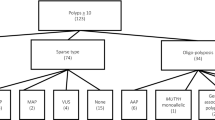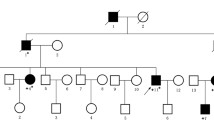Abstract
Familial adenomatous polyposis (FAP) is an autosomal-dominant disease caused by germline mutations in the adenomatous polyposis coli (APC) gene. The affected individuals develop colorectal polyposis and show various extra-colonic manifestations. In this study, we aimed to investigate the genetic and clinical characteristics of FAP in Taiwanese families and analyze the genotype–phenotype correlations. Blood samples were obtained from 66 FAP patients registered in the hereditary colorectal cancer database. Then, germline mutations in the APC genes of these 66 polyposis patients from 47 unrelated FAP families were analyzed. The germline-mutation-negative cases were analyzed by performing multiplex ligation-dependent probe amplification (MLPA) and single-strand conformation polymorphism (SSCP) analysis of the MUTYH gene. Among the analyzed families, 79% (37/47) of the families showed 28 APC mutations, including 19 frameshift mutations, 4 nonsense mutations, 3 genomic deletion mutations, 1 missense mutation, and 1 splice-site mutation. In addition, we identified 15 novel mutations in 32% (15/47) of the families. The cases in which APC mutations were not identified showed significantly lower incidence of profuse polyposis (P = 0.034) and gastroduodenal polyps (P = 0.027). Furthermore, FAP families in which some affected individuals had less than 100 polyps showed significant association with low incidence of APC germline mutations (P = 0.002). We have added the APC germline-mutation data for Taiwanese FAP patients and indicated the presence of an FAP subgroup comprising affected individuals with nonadenomatous polyps or less than 100 adenomatous polyps; this form of FAP is less frequently caused by germline mutations of the APC gene.

Similar content being viewed by others
References
Kinzler KW, Nilbert MC, Vogelstein B et al (1991) Identification of FAP locus genes from chromosomes 5q21. Science 253:661–664
Groden J, Thliveris A, Samowitz W et al (1991) Identification and characterization of the familial adenomatous polyposis gene. Cell 66:589–600
Su L-K, Kohlmann W, Ward PA et al (2002) Different familial adenomatous polyposis phenotypes resulting from deletions of the entire APC exon 15. Hum Genet 111:88–95
Michils G, Tejpar S, Thoelen R et al (2005) Large deletions of the APC gene in 15% of mutation-negative patients with classical polyposis (FAP): a Belgian study. Hum Mutation 25:125–134
Flintoff KJ, Sheridan E, Turner G, Chu CE, Taylor GR (2001) Submicroscopic deletions of the APC gene: a frequent cause of familial adenomatous olyposis that may be overlooked by conventional mutation scanning. J Med Genet 38:129–132
Sieber OM, Lamlum H, Crabtree MD et al (2002) Whole-gene APC deletions cause classical familial adenomatous polyposis, but not attenuated polyposis or “multiple colorectal adenomas”. Proc Natl Acad Sci USA 99:2954–2958
Bunyan DJ, Eccles DM, Silibourme J et al (2004) Dosage analysis of cancer predisposition genes by multiplex ligation-dependent probe amplification. Br J Cancer 91:1155–1159
Sellner LN, Taylor GR (2004) MLPA and MAPH: new techniques for detection of gene deletions. Hum Mut 23:413–419
Friedl W, Caspari R, Sengteller M et al (2001) Can APC mutation analysis contribute to therapeiutic decisions in familial adenomatous polyposis? experience from 680 FAP families. Gut 48:515–521
Miyaki M, Konishi M, Kikuchi-Yanoshita R et al (1994) Characteristics of somatic mutation of the adenomatous polyposis coli gene in colorectal tumors. Cancer Res 54:3011–3020
Moisio A-L, Jarvinen H, Peltomaki P (2002) Genetic and clinical characterization of familial adenomatous polyposis: a population based study. Gut 50:845–850
Mandl M, Paffenholz R, Friedl W et al (1994) Frequency of common and novel inactivationg APC mutations in 202 families with familial adenomatous polyposis. Hum Mol Genet 3:181–184
Crabtree MD, Tomlinson IPM, Hodgson SV, Neale K, Phillips RKS (2002) Explaining variation in familial adenomatous polyposis: relationship between genotype and phenotype and evidence for modifier genes. Gut 51:420–423
Bisgaard ML, Ripa R, Knudsen AL, Bulow S (2004) Familial adenomatous polyposis patients without an identified APC germline mutation have a severe phenotype. Gut 53:266–270
Heinimann K, Mullhaupt B, Weber W et al (1998) Phenotypic differences in familial adenomatous polyposis based on APC gene mutation status. Gut 43:675–679
Kairupan CF, Meldrum CJ, Crooks R, Milward EA, Spegelman AD, Burgess B (2005) Mutation analysis of the MYH gene in an Australian series of colorectal Polyposis patients with or without germline APC mutations. Int J Cancer 116:73–77
Prosser J, Condie A, Wright M et al (1994) APC mutation analysis by chemical cleavage of mismatch and a protein truncation assay in familial adenomatous polyposis. Br J Cancer 70:841–846
Miyoshi Y, Ando H, Nagase H et al (1992) Germ-line mutations of APC gene in 53 familial adenomatous polyposis patients. Proc Natl Acad Sci USA 89:4452–4456
Stella A, Resta N, Gentile M, Susca F, Mareni C, Montera MP, Guanti G (1993) Exclusion of the APC gene as the cause of a variant form of familial adenomatous polyposis (FAP). Am J Hum Genet 53:1031–1037
Spirio L, Otterud B, Stauffer D, Lynch H, Lynch P, Watson P, Lanspa S, Smyrk T, Cavalier J, Howard L, Burt R, White R, Leppert M (1992) Linkage of a variant or attenuated form of adenomatous polyposis coli to the adenomatous polyposis coli (APC) locus. Am J Hum Genet 51:92–100
Cao X, Eu KW, Seow-Choen F, Zao Y, Cheah PY (2000) APC mutation and phenotypic spectrum of Singapore familial adenomatous polyposis patients. Eur J Hum Genet 8:42–48
Kim DW, Kim IJ, Kang HC et al (2005) Mutation spectrum of the APC gene in 83 Korean FAP families. Hum Mutat 26:281
Scott RJ, Meldrum C, Crooks R et al (2001) Familial adenomatous polyposis: more evidence for disease diversity and genetic heterogeneity. Gut 48:508–514
Giardiello FM, Krush AJ, Petersen GM et al (1994) Phenotypic variability of familial adenomatous polyposis in 11 unrelated families with identical APC gene mutation. Gastroenterology 106:1542–1547
Ruiz-Ponte C, Vega A, Carracedo A, Barros F (2001) Mutation analysis of the adenomatous polyposis coli (APC) gene in northwest Spanish patients with familial adenomatous polyposis (FAP) and sporadic colorectal cancer. Hum Mutat 18:355
Aretz S, Uhlhaas S, Caspari R et al (2004) Frequency and parenteral origin of de novo APC mutations in familial adenomatous polyposis. Eur J Hum Genet 12:52–58
Ripa R, Bisgaard ML, Bulow S, Nielsen FC (2002) De novo mutations in familial adenomatous polyposis (FAP). Eur J Hum Genet 10:887–888
Acknowledgments
We acknowledge the co-operation of the FAP patients and their families, as well as of Dr. J. K. Lin, Dr. C. H. Yang, and Dr. C. C. Lee.
Author information
Authors and Affiliations
Corresponding author
Rights and permissions
About this article
Cite this article
Chiang, J.M., Chen, H.W., Tang, R.P. et al. Mutation analysis of the APC gene in Taiwanese FAP families: low incidence of APC germline mutation in a distinct subgroup of FAP families. Familial Cancer 9, 117–124 (2010). https://doi.org/10.1007/s10689-009-9292-2
Received:
Accepted:
Published:
Issue Date:
DOI: https://doi.org/10.1007/s10689-009-9292-2




